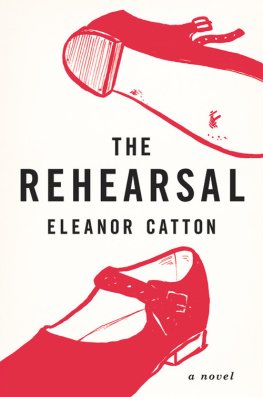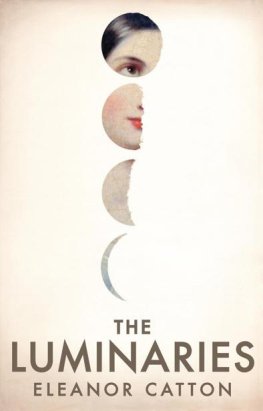The Rehearsal
by Eleanor Catton
Thursday
I cant do it, is what she says. I simply cant admit students without prior musical training. My teaching methods, Mrs. Henderson, are rather more specific than I think you understand.
A jazzy pulse begins, just drums and double bass. She swirls her spoon and taps it once.
The clarinet is tadpole to the sax, can you see that? The clarinet is a black and silver sperm, and if you love this sperm very much it will one day grow into a saxophone.
She leans forward across the desk. Mrs. Henderson. At present your daughter is simply too young. Let me put it this way: a film of soured breast milk clutches at your daughter like a shroud.
Mrs. Henderson is looking down, so the saxophone teacher says rather sharply, Do you hear me, with your mouth like a thin scarlet thread and your deflated bosom and your stale mustard blouse?
Mrs. Henderson nods imperceptibly. She stops fingering the sleeves of her blouse.
I require of all my students, the saxophone teacher continues, that they are downy and pubescent, pimpled with sullen mistrust, and boiling away with private fury and ardor and uncertainty and gloom. I require that they wait in the corridor for ten minutes at least before each lesson, tenderly nursing their injustices, picking miserably at their own unworthiness as one might finger a scab or caress a scar. If I am to teach your daughter, you darling hopeless and inadequate mother, she must be moody and bewildered and awkward and dissatisfied and wrong. When she realizes that her body is a secret, a dark and yawning secret of which she becomes more and more ashamed, come back to me. You must understand me on this point. I cannot teach children.
Kiss-kiss-kiss goes the snare drum over the silence.
But she wants to learn the saxophone, says Mrs. Henderson at last, sounding ashamed and sulky at the same time. She doesnt want to learn the clarinet.
I suggest you try the music department at her school, the saxophone teacher says.
Mrs. Henderson sits there for a moment and scowls. Then she crosses her other leg and remembers that she was going to ask a question.
Do you remember the name and face of every pupil you have ever taught?
The saxophone teacher seems pleased to be asked.
I remember one face, she says. Not one individual student, but the impression left by them all, inverted like a photographic negative and stamped into my memory like an acid hole. Id recommend Henry Soothill for clarinet, she adds, reaching for a card. Hes very good. He plays for the symphony orchestra.
All right, says Mrs. Henderson sullenly, and she takes the card.
Thursday
That was at four. At five there is another knock. The saxophone teacher opens the door.
Mrs. Winter, she says. Youve come about your daughter. Come in and well discuss carving her into half-hour slices to feed me week by week.
She holds the door wide so Mrs. Winter can scuttle in. Its the same woman as before, just with a different costumeWinter not Henderson. Some other things are different too, because the woman is a professional and she has thought about the role for a long time. Mrs. Winter smiles with only half her mouth, for example. Mrs. Winter keeps nodding a few seconds too long. Mrs. Winter inhales quietly through her teeth when she is thinking.
They both politely pretend not to notice that it is the same woman as before.
To start off with, says the saxophone teacher as she hands her a mug of black-leaf tea, I dont allow parents to sit in on private lessons. I know its a bit of an old-fashioned policythe reason is partly that the students are never at their best in that sort of environment. They become flushed and hot, and they laugh too easily and their posture changes, folding up tight like the lips of a blossom. Partly also, I think, the reason I like to keep things very private is that these little half-hour slices are my chance to watch, and I dont want to share.
Im not that sort of mother anyway, says Mrs. Winter. She is looking around her. The studio is on the attic level, and the view is all sparrows and slate. The brick wall behind the piano is chalky, the bricks peeling white as if diseased.
Let me tell you about the saxophone, says the saxophone teacher. There is an alto saxophone on a stand next to the piano. She holds it up like a torch. The saxophone is a wind instrument, which means it is fueled by your breath. I think its interesting that the word for breath in Latin is where we get our word spirit. People once had the idea that your breath and your soul were the same thing, that to be alive means, merely, to be filled with breath. When you breathe into this instrument, darling, youre not just giving it lifeyoure giving it your life.
Mrs. Winter nods vigorously. She keeps nodding a few seconds too long.
I ask my students, the saxophone teacher says, is your life a gift worth giving? Your normal, vanilla-flavored life, your two-minute noodles after school, your television until ten, your candles on the dresser and facewash on the sink? She smiles and shakes her head. Of course it isnt, and the reason for that is that they simply havent suffered enough to be worth listening to.
She smiles kindly at Mrs. Winter, sitting with her yellow knees together and clutching her tea in both hands.
Im looking forward to teaching your daughter, she says. She seemed so wonderfully impressionable.
Thats what we think, says Mrs. Winter quickly.
The saxophone teacher observes her for a moment, and then says, Lets go back to that moment just before you have to refill your lungs, when the saxophones full of your breath and youve got none left in your own body: the moment when the sax is more alive than you are.
You and I, Mrs. Winter, know what it feels like to hold a life in our hands. I dont mean ordinary responsibility, like babysitting or watching the stove or waiting for the lights when you cross the roadI mean somebodys life like a china vase in your handshe holds her saxophone aloft, her palm underneath the belland if you wanted to, you could just let go.
Thursday
On the corridor wall is a framed black-and-white photograph which shows a man retreating up a short flight of stairs, hunched and overcoated, his chin down and his collar up and the laces on his boots coming untied. You cant see his face or his hands, just the back of his overcoat and half a sole and a gray sock sliver and the top of his head. Onto the wall beside the staircase the man casts a bent accordion shadow. If you look closer at the shadow you will see that he is playing a saxophone as he ascends the stairs, but his body is hunched over the instrument and his elbows are close in to the sides of his body so no part of the sax is visible from behind. The shadow peels off to one side like an enemy, forking the image in two and betraying the saxophone that is hidden under his coat. The shadow-saxophone looks a little like a hookah pipe, dark and wispy and distorted on the brick wall and curving into his chin and into his dark and wispy shadow-hands like smoke.
The girls who sit in this corridor before their music lessons regard this photograph while they wait.
Friday
Isolde falters after the first six bars.
I havent practiced, she says at once. I have got an excuse, though. Do you want to hear it?
The saxophone teacher looks at her and sips her black-leaf tea. Excuses are almost her favorite part.
Isolde takes a moment to smooth her kilt and prepare. She draws a breath.
I was watching TV last night, she says, and Dad comes in with his face all serious and his fingers sort of picking at his tie like its strangling him, and eventually he just takes it off and lays it to one side
She unhooks her saxophone from her neckstrap and places it upon a chair, miming loosening the neckstrap as if it has been very tight.










